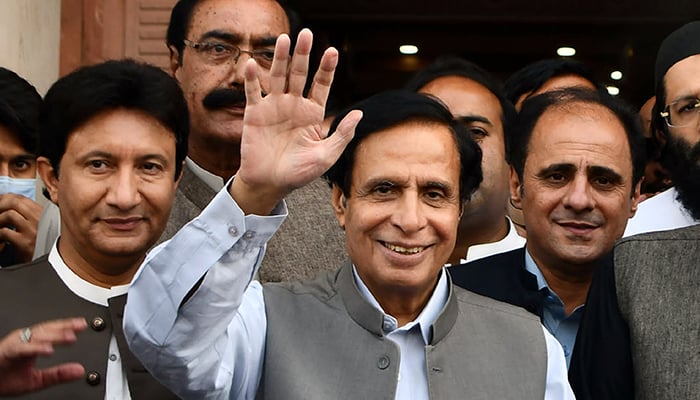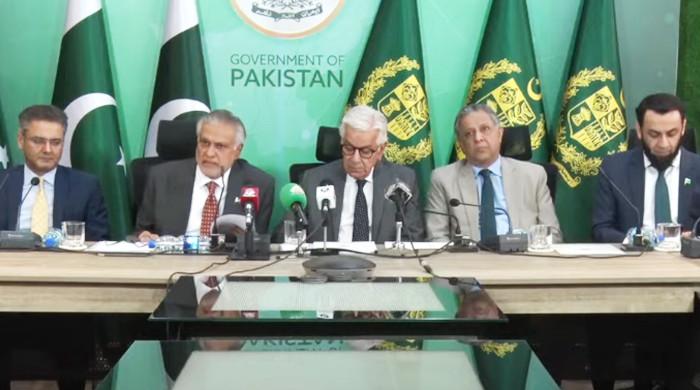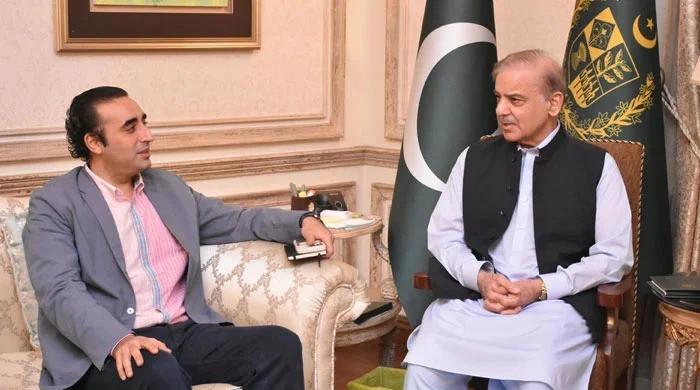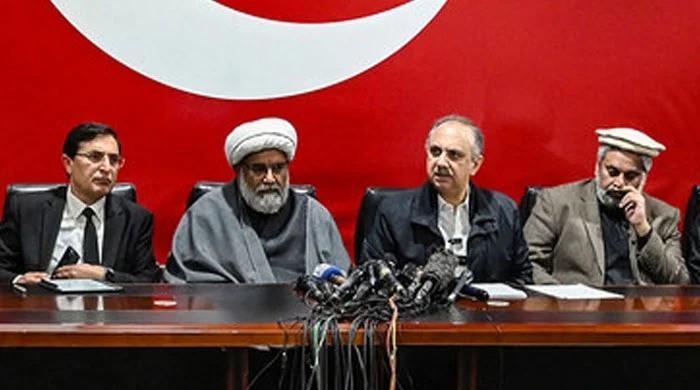Parvez Elahi reinstated as Punjab CM after taking ‘court into confidence’
CM Elahi assures Lahore High Court he will not dissolve assembly once reinstated; provincial cabinet restored
December 23, 2022

- Lahore High Court restores provincial cabinet, Elahi as CM.
- Elahi assures court he will not dissolve assembly once reinstated.
- Court issues notices to all parties for January 11.
LAHORE: The Lahore High Court (LHC) Friday restored the provincial cabinet and Parvez Elahi as the chief minister after he assured the court that he would not dissolve the Punjab Assembly once regains control of the office.
The LHC wanted an undertaking from Elahi that he would not dissolve the assembly as if he would resort to the move, it could deepen the ongoing political turmoil in the province.
Punjab Governor Baligh-ur-Rehman de-notified the Pakistan Muslim League-Quaid (PML-Q) leader as the chief minister as he did not take a vote of confidence despite the passage of several hours.
A five-member bench — headed by Justice Abid Aziz Sheikh and including Justices Justices Chaudhry Muhammad Iqbal, Tariq Saleem Sheikh, Asim Hafeez and Muzamil Akhtar Shabir — heard the case.
The court took two breaks — of 10 minutes and an hour — and asked Elahi's counsel Barrister Ali Zafar to consult his client about the undertaking.
Following the assurance of not dissolving from the PML-Q leader, the court reinstated him as the chief minister. The LHC also issued notices to all the parties in the case and summoned them on January 11.
The court suspended the governor's order till the next hearing and also did not make it compulsory for the chief minister to take a vote of confidence on the Punjab governor's orders.
However, it noted that the court's order "will not preclude the petitioner from taking a vote of confidence on his own accord".
Today's hearing
At the outset of today's hearing, Elahi’s counsel Barrister Zafar explained to the bench how his client was elected as the chief minister. He also mentioned the Supreme Court verdict which ruled in favour of the PML-Q leader.
Then, Zafar explained the two constitutional steps that can be used to remove a chief minister.
“A chief minister is elected by an assembly and can be removed via a vote of confidence. The second process is to ask the chief minister to take a vote of confidence,” said Zafar. He added that if the governor feels the chief minister has lost his majority, then a session can be called in for the purpose.
“If PTI says that it is not with the chief minister then it can be said that Elahi has lost the majority but the governor cannot ask the CM to take a vote of confidence in two hours,” said Zafar.
“All members need to be sent a notice,” maintained Elahi’s counsel. He added that at times some lawmakers are abroad so the speaker can give 10 days of notice.
“It is also possible that the speaker holds voting immediately,” remarked Justice Sheikh. It is not necessary to give a 10-day notice, he added.
At this, Zafar told the judge that the whole process [of summoning the assembly session] is between the governor and the speaker. He added that setting a date is the prerogative of the speaker.
“What the governor did [denotifying the chief minister] does not mean that the CM failed to secure the vote of confidence. The chief minister does not have the authority to call a session of the assembly,” said Zafar.
“Are you saying that summoning the session is the speaker’s prerogative,” asked Justice Sheikh. To this, Zafar responded in the affirmative.
“The law uses the word secretary then how is it the speaker’s prerogative,” asked Justice Sheikh.
Zafar then told the bench that Rule 24 states that the speaker convenes and adjourns the session.
Justice Sheikh told Zafar that the question is about an appropriate time frame.
“According to the Constitution, the governor can summon a session. Under the rules, the speaker gives the date of the meeting,” said Zafar. The chief minister has to come and take the vote of confidence he cannot take it in the air, said Barrister Zafar.
“The governor cannot say that the chief minister did not take the vote of confidence. When there was no session then how can the CM could have taken the vote of trust,” asked Zafar.
The counsel contended that there was disagreement between the governor and the speaker on calling the meeting.
At this point, Justice Sheikh interjected and remarked that there has been no voting, adding that if the PML-Q and PTI have the majority then there is no issue and a time can be given.
“For now we only want the suspension of the notification for removal from office. The governor concluded that Parvez Elahi avoided taking the vote of confidence,” said Zafar. He also claimed that the governor violated his oath.
“If there is no cabinet, then there is no government under Mustafa Ampex case,” remarked Justice Abid.
Then, Justice Sheikh asked that if the high court reinstates the chief minister immediately, will he dissolve the assembly. "A similar matter came up during the Manzoor Wattoo case. So, can you give us an undertaking that the assembly will not be dissolved?"
In response, Barrister Zafar said that since a no-confidence motion has been moved, the assembly cannot be dissolved. The court then told the lawyer that the no-confidence motion has been withdrawn.
"If your [client] dissolves the assembly, then the petition will become ineffective and a new crisis will be upon us," the court remarked.
The court then asked Zafar to consult his client and adjourned the hearing for 10 minutes.
Once the hearing resumed, Barrister Zafar said that he would not be able to provide an undertaking to the court as of now and urged the court to reinstate the chief minister and order him to not dissolve the assembly.
In response, the LHC bench noted that the court could not give interim relief to anyone without any assurance. "How can the court stop the chief minister from exercising his constitutional right?" Justice Hafeez asked.
The court then adjourned the hearing once again, this time for an hour and asked the lawyer to consult his client.
When the hearing resumed, Barrister Zafar furnished an undertaking from Elahi. Then, the court awarded a "temporary relief" to the PML-Q leader and reinstated him as the chief minister.
Change of bench
The petition was scheduled for hearing earlier today but a judge recused himself from the case after which the bench was dissolved.
The LHC CJ had formed a five-member bench headed by Justice Abid Sheikh to hear the petition.
However, when the hearing started, Justice Sheikh said that Justice Farooq Haider had represented the petitioner in many cases and he has requested to be excluded from the bench.
After this, the matter was again referred to the chief justice. Then, Justice Hafeez was been included in the bench, replacing Justice Haider.
Petition
In the petition, Elahi has appealed to the court to declare the governor’s move denotifying him as chief minister "illegal".
It informs the court that the Punjab Assembly Speaker Sibtain Khan was asked to summon a session for a vote of confidence. It added that the speaker did not summon the session as one was already underway.
“No action can be taken against any chief minister over speaker’s actions,” maintains the petition.
Governor Rehman was made the respondent in the case via his principal secretary and chief secretary of the province.
Political drama
The political crisis in Punjab does not seem to be ceased soon as lawmakers sitting on treasury and opposition benches appeared at loggerheads over who will get the CM's Office and who will take it over next.
In his bid to oust the chief minister, the governor — a member of the PML-N — had ordered the CM to take a vote of confidence at 4pm on December 21.
But Punjab Assembly Speaker Muhammad Sibtain Khan Punjab — a Pakistan Tehreek-e-Insaf (PTI) leader — termed the order against the Constitution and adjourned an ongoing session till Friday — which resumed today.
In response, the governor disagreed with the speaker and rejected his reasonings for not summoning a session. He added that the ruling has "no bearing" on the order to hold a session for the confidence vote.
Following this, in a notification issued in the wee hours of Friday, the governor de-notified Elahi as the chief minister, citing his reluctance to take a vote of confidence.
Rehman said that since he believes that Elahi does not command the confidence of the Punjab Assembly, he was de-notifying him as the chief minister and also dissolving the provincial cabinet.
But the PTI and PML-Q alike rejected the notification and moved the Lahore High Court against it.











